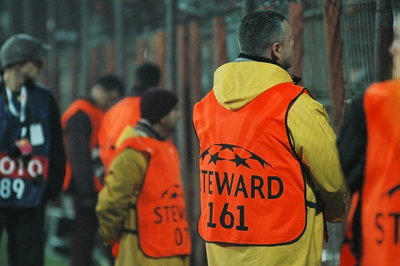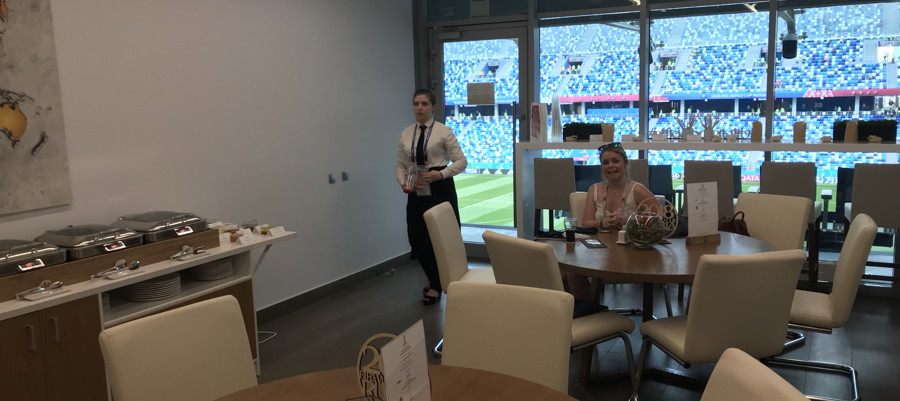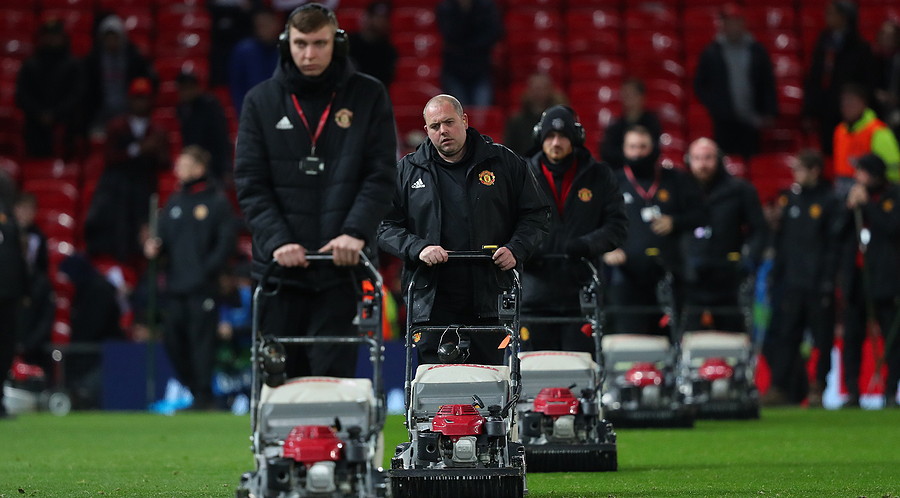 Elsewhere on the site you’ll be able to read about the backroom staff that work at a football club. These are the people that garner any of the attention that isn’t being thrown on the manager, but they’re more about making things tick for the football team itself.
Elsewhere on the site you’ll be able to read about the backroom staff that work at a football club. These are the people that garner any of the attention that isn’t being thrown on the manager, but they’re more about making things tick for the football team itself.
If you head to a football stadium to watch an actual match then there are a wealth of people who make the entire experience a smooth one for all concerned.
Whether it be the stewards who check your tickets and direct you to the correct area to sit or it’s the people working in the hospitality areas, there are usually hundreds of people scurrying around a football ground on match day.
There are also loads of people who keep working when no football is being played, from the groundskeepers through to the people that give tours of the stadium. We’ll have a look at them all here.
Match Day Staff

Let’s start by looking at the people that specifically work on match days and tend not to be needed when football matches aren’t taking place. They are the ones that make life easier for the supporters, mostly, and are considered to be ‘casual’ in nature.
Match days are obviously the times when a stadium is at its busiest so an influx of labour is necessary to help a club cope with demand.
Hospitality Personnel
The first place to start is with the people who work in hospitality. Whilst this is often thought of as being the ‘posh seats’, it’s actually necessary for such people to walk all around the stadium. Yes, many of the people will be public-facing, but there’ll also be those who are needed to wash glasses and cutlery, put food out and serve drinks. Pot-washers and storage room workers are all an unseen part of your experience on the day.
Executive Boxes Staff
A level up from standard hospitality staff, the staff that work in the executive boxes are usually more experienced. Here we’ll often be talking about fine dining and people paying such an amount of money for their tickets so as to expect silver service. From welcoming people into the stadium with a smile and dealing with punters who have specific requests through to pouring wine and serving food, the roles will be numerous.
Waiter & Waitressing Staff
This sort of falls into the above categories but is also a role of its own. There are some hospitality staff whose job will be specifically about welcoming people and dealing with problems, so others are needed to wait on the tables, take orders and serve food to guests. Sometimes it will just be re-filling banquet plates and cutlery, whilst others it will be dedicated table service for customers that have paid for it.
Entertainment Assistants
Many a football club has a mascot who will be used to entertain kids before a match. That’s an obvious example of an entertainment assistant, but there are also people who are needed to operate cameras that will capture content that will be put up onto big screens in or around the ground. Perhaps interviews with former players will be needed for social media channels, for example.
Safety Stewards
Arguably one of the most important of casual staff, the safety steward is a necessary part of the match day experience. They’ll be required to do things such as search bags or guide the public to where they’re sitting, monitor the crowds and check people’s tickets. They will patrol the stadium and keep an eye on supporters once the match gets underway, doing the likes of ensuring segregation between home and away fans.
Ticket Sales Staff
A lot of football clubs don’t sell out their matches, meaning that there is a need to have the ticket office open on a match day for anyone that wishes to pick up a ticket at the last minute. Often these people will work on non-match days too, of course, because ticket offices are open throughout the week during the season. It’s likely that clubs that expect to be popular on match days will bring in some staff just to help out, though.
Bookmaking Staff
Whilst often not part of the staff employed by the football club, a solid majority of football stadiums nowadays have bookmaking facilities on site. These obviously need to be staffed when a match is on, standing empty the rest of the time. The football clubs often aren’t responsible for employing them because it’s skilled work that requires the bookmakers in question to being in their own people, but they still count.
Chefs
Whether it be chefs, commis chefs or sous chefs, there are a wealth of roles that need casual workers to fill them when the match day comes around. Most football clubs offer food in some form or another, especially in the hospitality areas, so the numbers required to serve thousands or tens of thousands of people will obviously shoot up on a match day. At some clubs there’s even a live cooking experience for some hospitality tickets.
Bar Staff
A lot of football supporters like a drink. There will be thirsty people turning up hours before kick-off who want to get a pint or two down their necks before the game gets underway. There are obviously loads of permanent bars that will need staffing, but it’s also becoming more and more common for clubs to have mobile beer sellers who walk about with plastic cups and beer on a pump, flogging their wares.
Merchandise Sellers
Along with welcoming supporters into the ground on a match day, the other thing football clubs desperately want to do is sell official merchandise to them. This is where clubs stand a chance of making good amounts of money, so the club shop will have staff that only tend to work on match days in order to help with the influx of one-off customers. They will both get stuff out of the stockroom and serve on the tills, as well as re-stock shelves.
Non-Match Day Staff And Crossovers

Whilst the above is mostly made up of roles that are necessary on match days and mostly not needed the rest of the week, there are some people that will either work the rest of the week and not on match days or else work throughout the week.
Obviously this doesn’t include those staff members who will be employed for one-off events or similar, given that they’ll essentially operate in a similar manner to scaled down match days.
Grounds Staff
The first, and arguably most important, role that we will discuss here is the grounds staff. Their job is a key one, given that they are there to keep the playing surface in tip-top condition. They will follow instructions from the manager of the home side, who will perhaps want the grass grown longer if a quick passing team is the away side or have it cut short and well-watered if their own team is one of slick passing.
Academy Host Families
This is an unusual role, but one that is vital in terms of making young players feel at home. Football Academies will welcome children from all over the country, if not the world, hoping that they’ll develop into one of the best players to play the game. When they’re away from their own family they need somewhere to stay and someone to stay with, so clubs pay people to provide accommodation for these young players.
Education Tutor
Separate from the club staff but closely linked are education providers. Whether players are in the Academy or have joined the first-team from abroad, they will probably need some specialised education to help them develop and grow. Young players will continue their school lessons in between footballing ones, whilst foreign players will be taught English as quickly as possible to help them to integrate.
Social Media Teams
In the world of modern football, a team’s social media activity is almost as important as what takes place on the pitch. Old-fashioned supporters won’t want to hear it, but the likes of Twitter, Instagram and Facebook are the methods by which clubs communicate with fans. As a result, social media teams are well-organised and well-paid, doing what they can to constantly drive up follower engagement.
Website Administrator
Similar in nature to the social media team are the people who work on a club’s website. The administrator is responsible for ensuring that all aspects of the site are running well and updated on a regular basis, pulling together the work from the rest of the team. It is a vital service in the modern game, with supporters often using the website to find out reliable news and information about the team.
Television Staff
Football clubs, especially those in the Premier League, often have in-house television stations. These will broadcast a wealth of things, from old matches to interviews with players and managers. They need camera crews, sound engineers and producers who can work around the clock to deliver content to the supporters who will usually have paid money for a subscription to the channel in order to be kept up-to-date.
Press Officer
Clubs have to deal with the press. They might not like it, but it is the nature of the game and, in some cases, a contractual obligation. Top clubs will not only have a press officer but a whole team who deal directly with the press, coordinating with the manager about what message they want to get across and which members of the press they wish to speak to, perhaps in a newspaper or magazine spread.
Programme Editor
Just as the in-house TV channel is important, so too is the match day programme. It’s what clubs use to get their message over to fans, complete with articles written by the manager and the captain of the club. Obviously people are needed to write pieces for the programme, but the editor is the person who is responsible for bringing it all together into a coherent piece that can then be sold.
Other Roles
This is a bit of an all-encompassing section, but it’s fair to say that the biggest football clubs in the world are run like large businesses nowadays. There are countless different roles in the upper echelons of football clubs that need to be filled by experts in their field, whether it be sales officers or those that are responsible for creating and managing a club’s website.
Sales executives will be responsible for finding commercial partners, hitting certain KPIs and ensuring that a club’s monthly revenue stream is solid away from what is happening on the football pitch. They’ll need to keep their files up-to-date in order to ensure that they can chase up clients and so on. More and more, football clubs are becoming dependent on external revenue sources for countless reasons.
Because clubs are being run as big businesses, there are a huge number of roles available in executive offices that most football fans wouldn’t even think twice about. Just because they’re not the sort of things that are commonly associated with football clubs, however, doesn’t mean that they don’t exist or that it’s not important that the roles are filled by people with experience and expertise.
Another section of workers that are crucial to the football club are the marketing managers. Whilst the world’s biggest clubs like Liverpool and Manchester United won’t take much marketing, it’s still important that people are there to push the messages that the manager and others want to have pushed. At smaller, lesser-known clubs it becomes an even more important job and one that requires dedication and know-how.
In essence, if there’s a job that you can think of at any normal business, then there’s a good chance that a football club will offer a similar, if not identical role. Everyone will always think first and foremost about the players and the management team, but the smooth running of a football club, both on a match day and at other times, depends on so many more people than just them.
